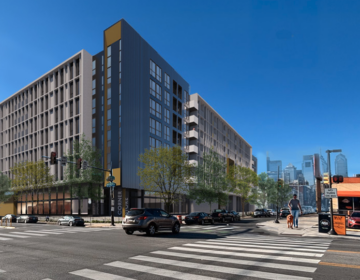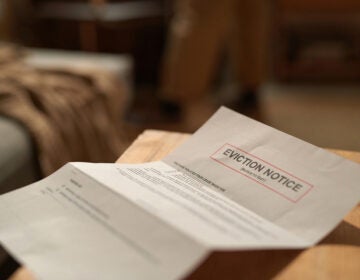Breaking news: Nutter shows up at eighth “Imagine Philadelphia” forum
Jan. 30
By Natalie Pompilio
For PlanPhilly
Generations ago, few Philadelphians could have imagined that Fairmount Park, simply a site for fresh water, would develop into a recreation center and source of city pride. That the Ben Franklin Parkway would offer world-class museums and cultural activities. That the Navy Yard would evolve from a defense contracting headquarters to a mixed used development.
But some city planners did. They saw the potential, worked with it, and helped create the city we have today.
Now, 40 years after the last one, it’s time once again for the city’s Planning Department to develop a comprehensive plan. And they don’t want to work alone. They care what citizens think.
That’s why dozens of people – representing everywhere from the local neighborhood to Mount Airy to Oak Lane to South Philly — crowded the auditorium at Center in the Park in Germantown Tuesday night for the eighth of nine “Imagine Philadelphia” meetings. The final one is slated for tonight (Thursday, 1/31) at Roxborough Memorial Hospital’s Wolcoff Auditorium between 6 and 8 p.m.
The point of the meetings is to find out how the public thinks the city should improve and in which direction it should head. After the meeting series is complete, the Planning Department will pull together the data, combine it with their expertise and come back to citizens with possible future development plans in the summer or early fall.
“We are a starting point for a new urban plan for the city,” said Mark Stroud of FX FOWLE, a consultant participating in the project. Individual commitment to a group effort could lead to success, he said. “This shows you all care and you’re all concerned about the future of the city.”
The meeting’s participants were divided into eight groups: Regionalism, Open Space and Environment, Economy, Neighborhoods, Public Services and Utilities, Housing, Transportation, and Culture and Tourism. Each was given about 40 minutes to discuss what needed to happen in their area.
John Haak, a 20+ year Planning Department employee who moderated the economy table, first asked participants to name positive projects currently going on in their neighborhoods. They were many, and people were clearly excited about them. They spoke of a new shopping strip near LaSalle University, plans to develop the area around the train station on Chelten Avenue, and Ogontz Avenue’s move to improve the appearance of its storefronts. Mt. Airy has now added a Business Improvement District, and the University of Pennsylvania City Planning Workshop is studying a secondary commercial corridor at Washington Lane and Chew Avenue.
Participants in the economy sub-group also had little trouble rattling off things that would attract businesses to the city – history, culture, diversity, universities, food, vitality, arts, public space, pride, neighborhoods – and even less trouble finding what needs to be improved – better public transportation, better schools, less crime, less rigamarole for a new business to get lost in when trying to open.
Then they got to the serious stuff: How can the city improve its economy? Some suggestions:
The Comcast Center is great, but such a mega-company/building is a rarity. The city needs to focus on small business development. Supporting such development would mean streamlining the current zoning and planning restrictions and reassessing the tax system, including the wage tax.
The city should develop business and industry clusters. For example, reclaiming current brownfields and establishing an area for the medical fields. This would create competition. Plus, current development of the brownfields has been “reactionary” – done in a piecemeal style. Instead, the city should try to look at the big picture and figure out what businesses would best fit into an area. Also, vacant properties must be addressed. Could local workers learning trades in local programs help rebuild these? Give employers incentives to hire
Connect schools – colleges and high schools – with local businesses via apprenticeships and vocational programs. This would encourage people to stay and live and work in the city.
The city also needs an attitude overhaul. That means keeping things clean so businesses want to move here. “Everybody has to buy into the idea of being an apostle for the city,” one man said. The feelings of good cheer should also extend to city employees.
“It shouldn’t take eight weeks to get a stop sign back up,” another man observed. If the city responded quickly and efficiently, people would feel their tax dollars were being spent well and not wasted.
Among the conclusions of the seven other groups:
Open Space/Environment: The wonderful green spaces in Germantown and the surrounding neighborhoods are under utilized and need to be more inviting. Transportation to the area from Center City needs to be streamlined: One bus line will take players close to one area tennis court and park, but they still must walk on sidewalkless streets to get to their games. Trash and recycling must also be improved
Neighborhoods: Germantown and this area of Northwest Philadelphia has as much history as downtown – as well as a historic battlefield – yet not every visitor knows that. The area needs to improve its reputation and help visitors feel safe.
Regionalism: There’s a disconnect between the great hospitals and universities the city has and the actual people who live here, who may lack insurance or an education. That must change. Individual economic groups are too divided. Also, the surrounding area should take some sense of responsibility for the upkeep and preservation of Philadelphia landmarks.
Housing: The local workforce should be trained and put to work improving the housing stock. People should also be kept aware of the historic significance of their properties so they can preserve it as much as t hey can.
Public Services and Utilities: The city needs better recycling. (This was one comment that drew applause.) Residents should learn about installing green roofs. “The city could be known as the green city and the clean city,” the representative from this group said. The problem of homelessness is on the rise and needs to be addressed. Library hours need expanding.
Tourism: The city needs something big, like the Olympics, to generate national and international interest. An Arts debit card could be a way to encourage people to visit museums and other cultural events. The annual July 4 celebration should be stretched city wide. The city has a jazz history that rivals New Orleans’ and people should know it. Artists should be encouraged to move here, perhaps by converting some old industrial buildings into artist lofts.
Transportation: The bones of the system are good, but it’s an old skeleton. Everything runs to and from Center City. That has to change. What about more links to the suburbs? The city should work with other regional centers to make this happen. Better marketing of the public transportation system, as well as improvements like clean-ups and safety, would bring more users.
Mayor Michael Nutter made a guest appearance at the meeting, coming in towards the end and listening to the remaining reports before taking the microphone.
“Some people in Philadelphia seem to think citizens don’t care about planning … I’ve known for a long time they’re incorrect,” Nutter said. “We can grow this city in ways that make sense.”
He asked the audience if they knew how many boards and commissions the city had. No one had an answer. He said he didn’t really either, but thought there were about 80.
“We have no comprehensive list,” he said.
To emphasis how important planning and zoning is to him, Nutter noted that the first three appointments he’s made have been a committee to revise the zoning code, the Zoning Board of Adjustment and the Planning commission.
“We’re going to plan this city well,” he said. “We’re going to run this city well. And you’re going to be very proud.”
Contact the reporter at nataliepompilio@yahoo.com
WHYY is your source for fact-based, in-depth journalism and information. As a nonprofit organization, we rely on financial support from readers like you. Please give today.






